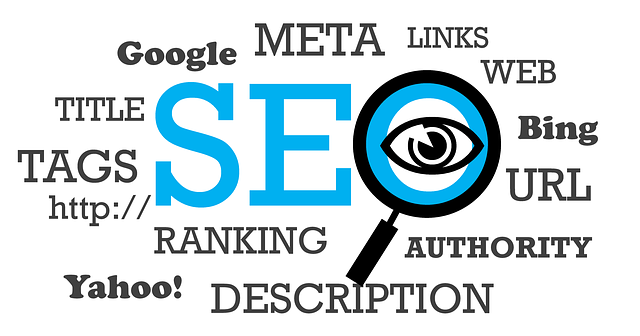Organic reach and Search Engine Optimization (SEO) are key metrics for online success. SEO enhances visibility by optimizing content for search engines like Google, focusing on user intent, relevant keywords, high-quality content, and a robust online presence. This drives increased traffic, improved engagement, brand authority, and ultimately boosts business growth through longer dwell times, lower bounce rates, and higher conversion probabilities. Effective SEO strategies involve creating valuable content, understanding target audiences, keyword research, technical optimizations, and building quality backlinks. By measuring and analyzing performance, businesses can refine their approaches and stay competitive in the digital realm, adapting to trends like mobile optimization and voice search technology.
In today’s digital landscape, improving organic reach is vital for any business aiming to thrive online. This article guides you through the intricate world of Search Engine Optimization (SEO), revealing its immense benefits in boosting visibility and attracting targeted traffic. From understanding the fundamentals of organic reach to crafting effective SEO strategies, we’ll explore key tactics. Learn how website optimization, compelling content creation, keyword mastery, and link building can propel your online presence. Discover the latest trends ensuring sustained growth in the ever-evolving realm of SEO.
Understanding Organic Reach and SEO: The Basics

Organic reach refers to the visibility and potential audience size of your content or website without paid promotion. It’s a powerful metric that indicates how well your online efforts are resonating with users who aren’t directly targeted through advertising. Search Engine Optimization (SEO), on the other hand, is the practice of enhancing these organic results by optimizing content for search engines like Google. SEO involves understanding user intent, using relevant keywords, creating high-quality content, and building a robust online presence to rank higher in search results.
By focusing on the benefits of Search Engine Optimization, such as increased website traffic, improved user engagement, and enhanced brand authority, businesses can significantly boost their organic reach. Effective SEO strategies not only attract more visitors but also foster longer dwell times, lower bounce rates, and higher conversion probabilities. This, in turn, contributes to a stronger online presence, better customer acquisition, and ultimately, business growth.
How Search Engine Optimization Boosts Visibility

Search Engine Optimization (SEO) is a powerful tool for boosting online visibility and reaching a wider audience. By optimizing your website’s content, structure, and overall user experience, SEO ensures that your pages rank higher in search engine results pages (SERPs). This increased ranking translates to better visibility, as most internet users rarely go beyond the first page of search results. Higher rankings mean more organic traffic, as people are more likely to click on the top results.
The benefits of SEO extend further, impacting not just website visits but also user engagement and trust. When your site appears in relevant search queries, it builds authority and credibility in your niche. This is because search engines prioritize delivering high-quality, valuable content to users, and consistent optimization efforts reflect that commitment to excellence. As a result, your brand becomes a go-to resource for potential customers, fostering long-term relationships and driving sustainable growth.
Key Factors in Effective SEO Strategies

In the realm of online visibility, Search Engine Optimization (SEO) stands as a cornerstone for boosting organic reach. Effective SEO strategies aren’t merely about ranking higher on search engines; they’re tailored to offer valuable content that resonates with users’ queries and interests. Key factors driving successful SEO include understanding target audiences, conducting thorough keyword research, and creating high-quality, relevant content. By aligning website content with user intent and leveraging the right keywords, businesses can enhance their search engine visibility, drive targeted traffic, and ultimately, capitalize on the benefits of Search Engine Optimization.
Additionally, technical aspects like website speed, mobile-friendliness, and a well-structured information architecture play pivotal roles. Optimizing these elements ensures that search engines can efficiently crawl and index web pages, thereby improving overall performance. A balanced approach that combines compelling content, strategic keyword placement, and seamless user experience forms the backbone of any robust SEO strategy aimed at expanding organic reach in today’s digital landscape.
Optimizing Your Website for Search Engines

Optimizing your website for search engines is a strategic process that goes beyond mere keyword stuffing. It involves understanding how search algorithms work and tailoring your online content, structure, and metadata to align with their preferences. The benefits of Search Engine Optimization (SEO) are multifaceted; it enhances your website’s discoverability, driving organic traffic from potential customers actively searching for products or services related to your offerings.
By optimizing your site, you ensure that search engines can crawl and index your content efficiently, which leads to better rankings on search result pages. This increased visibility can significantly boost your brand’s online presence, credibility, and ultimately, sales. Effective SEO strategies also encourage user engagement through relevant and valuable content, encouraging visitors to spend more time on your site and reducing bounce rates.
Content Creation for Increased Organic Traffic

Creating high-quality, SEO-optimized content is a powerful strategy to boost your site’s organic reach and attract more visitors. By understanding what your target audience is searching for and incorporating relevant keywords naturally into your content, you can improve your search engine rankings and increase visibility. This involves conducting thorough keyword research to identify the terms your potential customers use when looking for products or services similar to yours.
Focus on creating comprehensive, valuable, and unique content that answers common questions or solves problems for your audience. Search engines like Google favor in-depth articles, blog posts, or guides that provide a detailed understanding of a topic. Regularly updating your site with fresh content not only keeps visitors engaged but also signals to search engines that your website is active and relevant, leading to better organic performance and increased traffic over time.
The Role of Keywords in SEO Success

Keywords play a pivotal role in the success of any Search Engine Optimization (SEO) strategy. They are the bridge between what your audience is searching for and the content you provide. When strategically placed within your website’s metadata, headings, and content, keywords enable search engines to understand the context and relevance of your pages. This, in turn, boosts your site’s visibility in organic search results.
The benefits of SEO extend far beyond increased online visibility; it’s about attracting the right audience. By researching and incorporating relevant keywords, you ensure that your website appears when potential customers are actively searching for products or services related to your offerings. This targeted approach not only drives more traffic but also enhances user experience by providing them with content that directly addresses their needs.
Building Quality Backlinks for Better Rankings

Building quality backlinks is a cornerstone of successful Search Engine Optimization (SEO) strategies, offering numerous benefits that drive organic reach. These links act as votes of confidence from other websites, signaling to search engines that your content is valuable and trustworthy. When high-authority sites link to yours, it boosts your website’s credibility and visibility, leading to improved rankings on search result pages.
By focusing on acquiring backlinks from reputable sources, you enhance your site’s authority, which in turn increases its likelihood of appearing higher in search results for relevant keywords. This process not only draws more organic traffic but also fosters a positive feedback loop, encouraging further high-quality linking and amplifying the overall benefits of SEO.
Measuring and Analyzing SEO Performance

Measuring and analyzing SEO performance is a vital step in understanding the benefits of Search Engine Optimization. By utilizing analytics tools, businesses can track key metrics such as organic traffic, keyword rankings, click-through rates, and bounce rates. These insights allow for data-driven decisions on which strategies are effective and where improvements can be made. Regular analysis enables marketers to refine content strategies, optimize website structure, and stay ahead of algorithm updates, ultimately enhancing the site’s visibility and driving more relevant traffic from search engines.
The benefits of Search Engine Optimization extend beyond increased organic reach. Effective SEO improves user experience by ensuring that a website is fast, mobile-friendly, and easy to navigate. It also fosters trust and credibility as high rankings on search engine results pages (SERPs) suggest a site’s authority on the topic. By analyzing these aspects of performance, businesses can further optimize their sites to provide valuable content that satisfies user queries, leading to longer engagement times and better conversion rates.
Staying Ahead: Trends in SEO for Future Growth

To stay ahead in the ever-evolving digital landscape, understanding and adapting to SEO trends is crucial for future growth. Search engine optimization (SEO) is a dynamic field that continues to transform with changing user behaviors and algorithms. One prominent trend is the increasing importance of mobile optimization. With most users accessing search engines via their smartphones, ensuring your website is mobile-friendly becomes essential. Additionally, voice search technology is gaining traction, prompting a shift towards optimizing content for long-tail keywords and natural language queries.
Another notable development is the emphasis on user experience (UX). Search engines prioritize websites that offer fast loading times, intuitive navigation, and high-quality, engaging content. Focusing on these aspects not only enhances the benefits of SEO but also improves overall user satisfaction. Moreover, building a robust backlink profile remains vital for boosting organic reach. Effective strategies include creating valuable content that naturally attracts links and collaborating with influential entities in your industry to secure high-quality backlinks.
